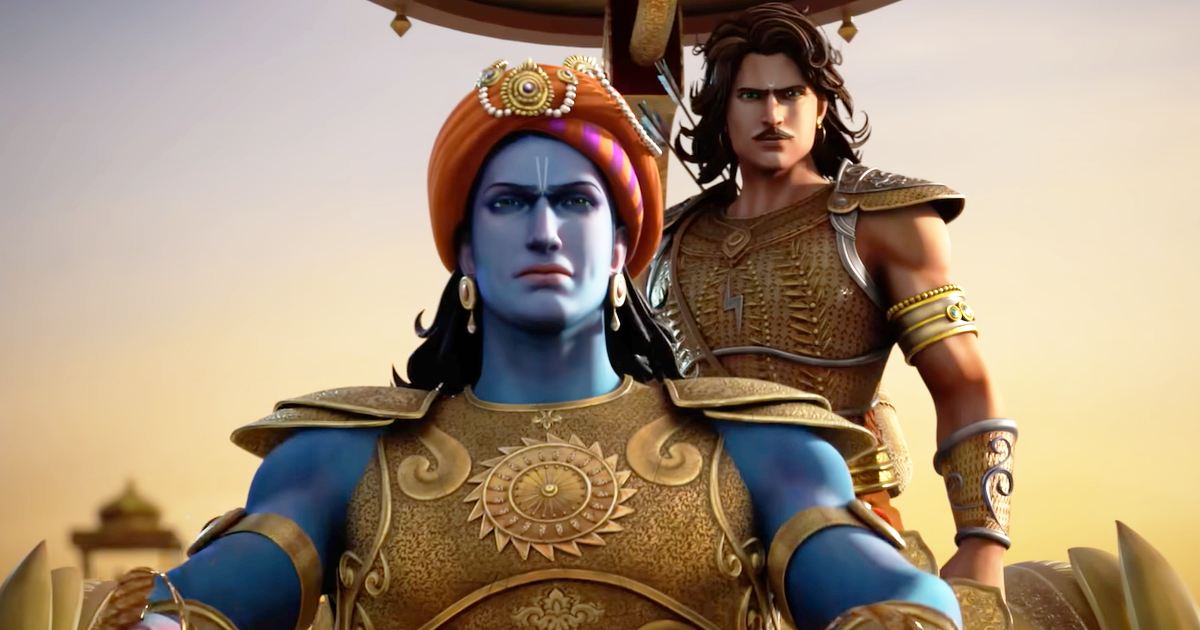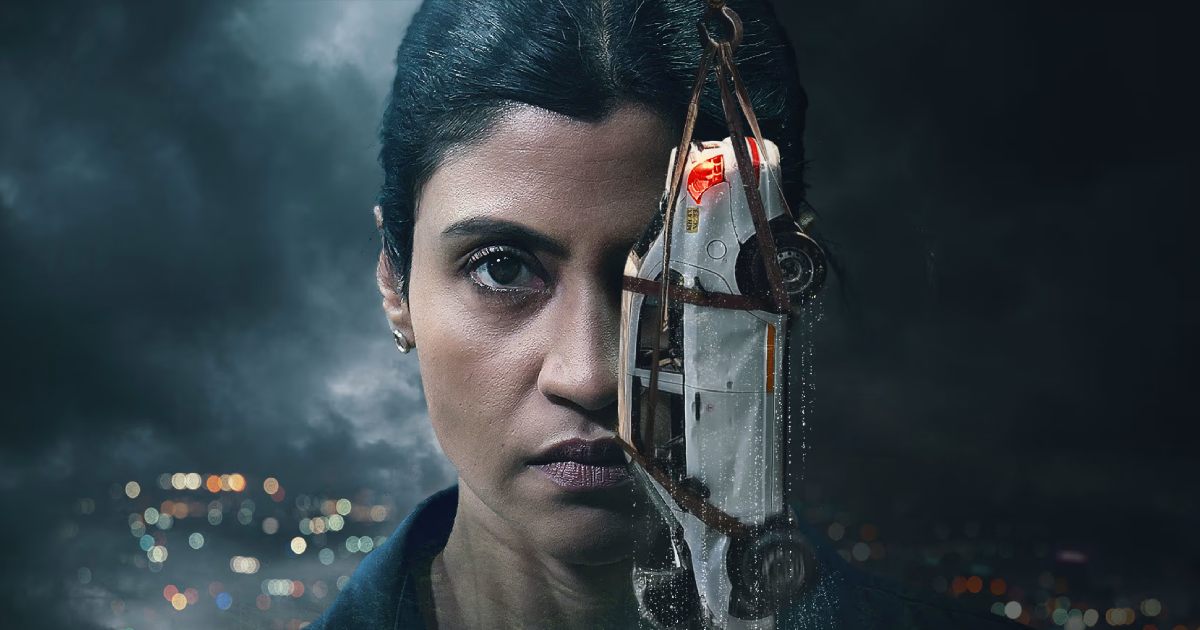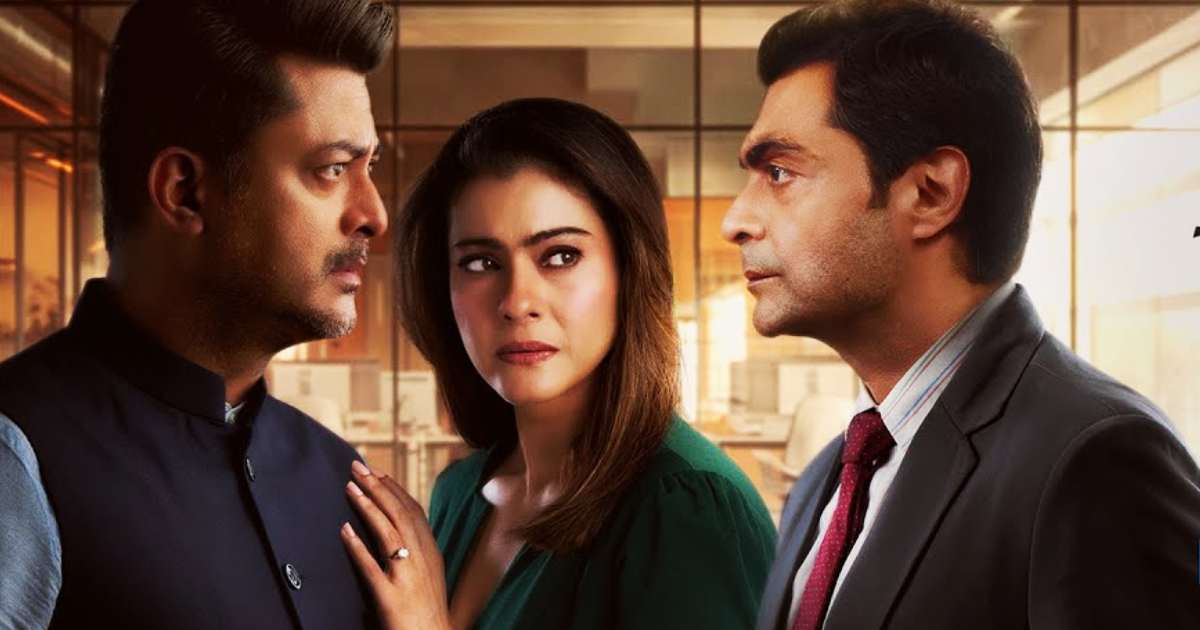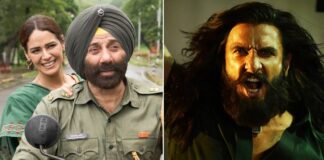
Cast: Vinod Sharma, Sahil Vaid, Saumya Daan, Annamaya Verma, Manoj Pandey, Himanshu Rana, Neha Gargava, Neshma Chemburkar, Pawan Kalra, Krutarth Trivedi
Creator: Anu Sikka
Director: Kaushik Ganguly, Ujaan Ganguly
Streaming On: Netflix
Language: Hindi, English, Tamil, Telugu, Malayalam, Kannada
Runtime: 9 episodes of 30 minutes each
“Jhooth se kahin zyada ghaatak hota hai ardhasatya. Kyunki jhooth to hum nakaar bhi sakte hain lekin ardhasatya mein satya ka vishwaas bhi hota aur jhooth ka vishwaasghaat bhi.” With this declaration, Kurukshetra Part 2, a brilliant web series on Netflix, begins with the most brutal backstabbing episode in mythology – Ashwatthama Hatohathah! You might have often heard the phrase Naro Va Kunjro Va, in many shows, and it finds its roots in this very battle of Kurukshetra when Yudishthir announced, “Ashwatthama mara gaya, lekin nar nahi kunjar.” However, when he utters lekin, Lord Shri Krishna blows the Shankha, and no one gets to know the second half of the sentence, and the episode is carved in history as one of the biggest betrayals!

Kurukshetra: Part 2 Review: What’s It About:
While the first part of the web series arrived with nine episodes the second part arrives with another 9 episodes. In total the 18 episodes depict the 18 days of the battle of Mahabharata that was fought in Kurukshetra – discussing 18 different characters of the war not necessarily hero or villain but just warriors! Some who fought the battle on the ground and others who fought it from the backdrop!
Kurukshetra part 2 presents the last four days of the battle of Mahabharata and the 9 warriors – Yudishthir, Kripacharya, Kunti, Dushasan, Karn, Duryodhan, Bheem, Ashwatthama, Stree Parv, and Krishn! Director Ujaan Ganguly and the team deserve credit for refusing to deliver a simple, sanitized hero vs villain narrative. This installment of the web series covering the final, brutal four days dives deep into the moral decay that defined the war, reminding us that in Kurukshetra, righteousness was rarely clear-cut, and everyone eventually paid the price.
Kurukshetra: Part 2 Review: What Works:
The web series wins in its writing, where it only portrays two sides of the war, never justifying any side, and highlighting whatever was morally not sane. Both sides cried their hearts out over losing their loved ones, and both sides still chose revenge. Sympathy was a luxury none of the sides decided to pick!
The narrative in Kurukshetra Part 2 refuses to romanticize anyone. Lord Krishna is divine, yet utterly human and strategically cruel, held accountable for his ‘adharma’ when necessary. Karna’s tragedy is acknowledged, but his cruelty is never excused. Even Duryodhana’s inevitable end manages to feel painfully tragic, earned through his choices, but still tragic.
The show excels at portraying the internal conflict and moral dilemmas of the warriors, especially in the wake of losses. It turns the battlefield into a mirror of human conscience. Meanwhile, Gulzar Sahab‘s involvement with the show as the narrator adds immense weight and emotional resonance, bridging the ancient mythological story with a compelling, emotional core.

Kurukshetra: Part 2 Review: Star Performance:
In one of the episodes, Karna turns into the major disruptor. His greatness as a warrior poses such a threat to the Pandavas that Arjun is all set to kill his own brother, Yudishthir. It is Krishna who handles the situation with his philosophy, handling Arjun’s anger with his psychological lessons. The episode Karna, which brings two of the greatest warriors of ancient times face-to-face – Karna and Arjun, is one of the best episodes of the series. The episode, in fact, starts with one of the greatest twists of the Mahabharata, “Karna ne Duryodhan se jo maanga use sunkar sird Duryodhan hairaan nahi hua, Kurukshetra mein jisne dekha tha, chaunk gaya. Karna ke saarthi the Maharaj Shalya, Pandu ki patni Maadri ke bhai aur Nakul – Sahdev ke Mama Shalya.”
Karna’s journey dominates the middle order of this series. His character arc is arguably the most compelling: a man defined by loyalty and cursed by fate. His final confrontation with Arjuna gives goosebumps, yet his defeat, under unfair circumstances, evokes immense pity.
Trending
Kurukshetra: Part 2 Review: What Doesn’t Work:
Kurukshetra Part 2 is less concerned with simply counting casualties and more focused on the weight of choices. We feel the impact of losses, particularly the devastation following Abhimanyu’s death, which fuels Arjuna’s moral descent. Every conflict, from Arjuna’s reluctance to Bhima’s revenge, is a struggle between duty, desire, and conscience. The series effectively argues that the ultimate battlefield is not the field of Kurukshetra, but decoding the grey areas of the human mind and soul! However most of these arcs are very rushed when compared to a healthy pace of part 1. This at times, does not give you the time to consume all that is being offered!

Kurukshetra: Part 2 Review: Last Words:
In one of the initial scenes of Kurukshetra Chapter 2, Kripacharya tells Ashwatthama, “Tumhare paas Narayan astra hai, lekin Krishna to swayam Narayan hai. To ye yuddh barabari ka kaise hua?” However, in the very next scene, Lord Krishna tells Arjun that Duryodhana was given the option to choose him or his Narayani Sena. Today, he will regret choosing the Narayani Sena over Narayan! The entire web series is beautifully deconstructed into one’s choices and the repercussions of those choices!
Kurukshetra Part 2 is one of the darkest resolutions of a battle! It clearly indicates that the battlefield is not merely covered in soulless, dead bodies but in shattered ideals. It leaves you with a haunting realization – that the war was a curse on all who fought it, leaving behind no winners, only survivors dealing with trauma and unimaginable loss. Dilemma, and guilt over compromised morality. Probably this is the cost of a war – the humanity that is lost!
The final takeaway from Kurukshetra is brilliant as Shri Krishna presents the verdict – Kurukshetra ka yuddh, Kshatriyata ka utsav nahi, balki Rajneeti ki haar hai. Yahi shasan ka satya hai, aur jeevan ka bhi! (The battle of Kurukshetra is not a celebration of warriors, but a disappointing loss of political moves. This is the ultimate truth of governance and life.) The only constant in life is change – for the good or the bad!
Probably, this is the benchmark every mythological epic should refer to – hopefully, Ranbir Kapoor’s Ramayana matches this standard!
4 stars.
For more such Web reviews, stay tuned to Koimoi.
Follow Us: Facebook | Instagram | Twitter | YouTube | Google News
















